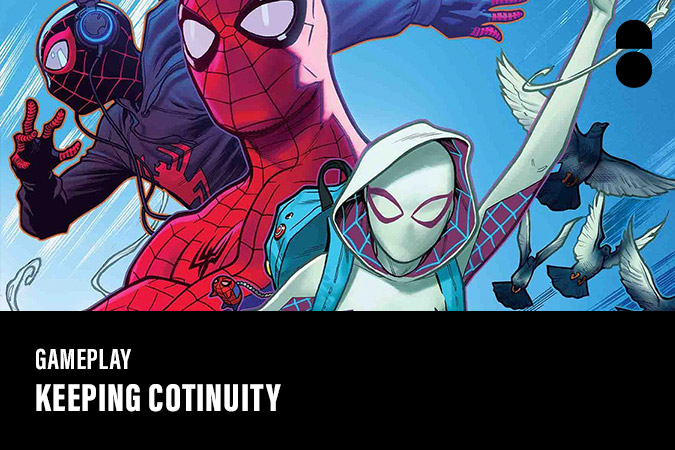Overview
The following sections will detail different aspects of a shared-continuity universe spanning several different campaigns, goals, and styles. While the shared-continuity approach is emblematic of the source material (comics, and the Marvel Cinematic Universe), it is entirely optional.
Multiple Narrators & Games
The most faithful approach to shared continuity is using multiple Narrators and players. This is similar to the multiple writers and artists, or screenwriters and film directors that help build upon the ground that others have broken before.
It’s likely to also be the most challenging. It requires the Narrators to be in constant contact, sharing and shaping the larger universe together. From a gameplay standpoint, it also requires that each Narrator adopt similar approaches to mechanics, leveling, and player safety. It adds a level of cooperation and sacrifice that is surplus to a standard TTRPG game.
The trade-off is that it allows multiple Narrators to identify their corners of the universe and develop them with greater individual care.
While building continuity between multiple games in a larger overworld is a challenge, Absolute Overpower believes it’s an important part of the superhero/comic book RPG experience. It should never be a burden, however. Narrators and players can find the best way to include it (or not) for them.
Ping Pong
An alternate option is the “ping pong” method where the same group of players and the Narrator rotate titles and plots as necessary or desired. The advantage of this approach is that it allows for total control and understanding by a single party and Narrator. It also gives players the chance to see how events from one campaign impact the other and vice versa. It’s a full 360 view of the world.
However, it puts a much larger burden on a single Narrator and actually complexifies the preparation needed to essentially run several games inside a larger universe.
It can also be distracting and distancing for players. Throughout different missions and plots, players will naturally gain a preference for individual characters. Asking them to then jump into a different character, playing through a story that does not immediately address the plots they’re partial to can be a dissatisfying experience. It also multiplies the amount of notes they’ll need to take!
Solo Campaigns
TTRPG games are often built around the concept of “team.” The party is often the focal point of campaign design. However, comic books and movies thrive on singular stories and how they reflect or build up to these larger team moments. Absolute Overpower encourages Narrators to run and integrate solo (or small team) stories, much like its source material. It’s entirely possible to start with several solo campaigns that intertwine, building an Avengers team, just like the MCU!
External Continuity
Note that while the internal continuity of the universe—and the campaigns within it—are important, external continuity is not. This means that players are not required to have extensive knowledge of either Marvel Comics or the Marvel Cinematic Universe at all. Campaigns can play with as much or as little external continuity as intended by the players.
For example, let’s say a player is really interested in playing Spider-Gwen, but, doesn’t know how that would conflict with a Spider-Man player whose comic backstory includes the death of Gwen Stacy. The comics solve this approach by making Spider-Gwen an alternate reality version. That is needlessly fussy for a campaign backstory, so it’s recommended that the player and DM agree that Spider-Gwen just is part of the same universe. The rationale used is ultimately not important unless the Spider-Gwen player is interested in being from an alternate reality.
If players are more familiar with an MCU version of a character—like say, Valkyrie (as portrayed by Tessa Thompson)—let them play that version. Even if it’s part of a Night Shift team that has Shadowland as a Hub, which doesn’t exist in the MCU. Ultimately, this is all minutiae that won’t impact the game. Players should play heroes as they want to play them and only need to acknowledge what is important to their backstory, and the internal continuity that will come from the campaign.
